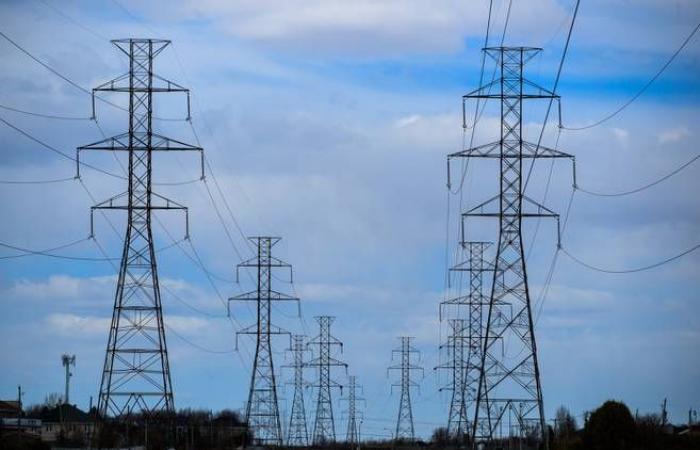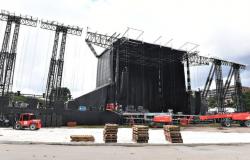Meanwhile, large energy-intensive companies here – economic development obliges – were boasting about paying a few cents per kilowatt hour, significantly less than residential customers.
Things have changed: by dint of shedding our hydroelectricity, we are now starving. The reality is more complex but the bottom line remains: unless we build new large dams, we will have to resolve to consume less and pay more one day or another. It is also the ecological measure to adopt.
That day is fast approaching. Meanwhile, we are racking our brains at Hydro and in the office of Minister of the Economy Pierre Fitzgibbon to come up with solutions that would not hurt Quebecers too much.
The Minister of the Economy Pierre Fitzgibbon. (Erick Labbé/Archives Le Soleil)
I was shocked when I heard one of the ideas proposed, straight out of the perfect socialist’s handbook, namely taxing the rich. Impose higher rates for large houses, so-called imposing houses to borrow the vocabulary of the state company headed by Michael Sabia.
Like Québec solidaire which wanted to overtax large vehicles, the famous orange tax (a good word from François Legault who often misses them).
The rich hunting season is open. The ball started with the increase in tax rates on capital gains, a measure that smacks of fairness and justice until we realize that it will not only penalize the rich, but also the small owners whose house is the promise of income for their old age when it is sold and small investors who exercise financial prudence.
Little liberticidal sides
In the case of Hydro-Québec, overcharging the big houses has some liberticidal aspects – can we choose the house that suits us without the “moral” intervention of the State which raises not only ethical, but practical questions. At this point, it is no longer billing but taxation.
This reminds me of politicians trying to determine who is middle class. This ranges from $50,000 in income per year to $100,000, which raises eyebrows for many in a province where the median income is $73,700 per year, according to Statistics Canada (2020 data).
What is a large residence in 2024? A castle in Westmount, a big bungalow from the 60s in a wealthy suburb? A hockey players’ house? A 3000 square foot condo? Does an apartment building qualify?
In short, who will decide what a big house is and according to what criteria? Especially since it is in Hydro-Québec’s interest to include as many residences as possible in this category. Otherwise, what is the exercise worth?
I don’t live in a big house — about 1,800 square feet — but I find this measurement absolutely despicable. It is a punitive tax. You have succeeded, you have a more “imposing” house than average, pay now. You should have stayed in your four and a half.
Yes, but these owners will say, we are already paying more because of the size of our house, our in-ground pool and our luxurious spa with bar and television and little white lights that twinkle in the night. Yes, but, replies the state company, all residential customers pay the same rate. The idea is to overcharge, to impose a higher rate than that of the neighbor who is satisfied with a so-called normal-sized house.
The pleasure of one is to see the other pay more, to paraphrase Félix Leclerc.
Now, Hydro-Québec may have forgotten this, but not all residential customers pay the same rate. There are two distinct levels: beyond a certain consumption, the price increases.
Hydro-Québec, the creator of this measure which could be considered discriminatory, does not specify what an imposing house is. Who’s gonna do it? Would a family of five children — yes, it exists — who needs more space than a couple without children be penalized? Are we going to tell parents “put two children per room”, “live less comfortably”?
Unlike Québec solidaire which paid dearly for its orange tax during the last elections, Hydro-Québec is not subject to any plebiscite. She has free reign. His only switch is Minister Fitzgibbon. The same one who thinks that Quebecers should get up in the middle of the night to run the dishwasher.
Pay more
We consume a lot of electricity in Quebec. We have been told for many moons that we are lucky to have this cheap electricity. Should we be surprised that we use it liberally? Habits are hard to change. To get there, everyone will have to pay more, even if it means giving discounts to the less well-off. It’s the only way. Everything else is a show off. Half measures.
I live in Ontario, in the French-speaking East. What was my surprise when I moved here to find that electricity costs double in Quebec. Can I tell you that we have moved towards energy efficiency in a short time?
When the wallet cries, we comply.
We take into account dynamic rates which increase during peak periods. You won’t see me doing my laundry at supper time when the rates are higher. I wait at 9 p.m. (not the middle of the night) and I’m no worse off.
(How is it, by the way, that Quebec is still hesitant to impose dynamic tariffs when they are part of the energy solution in other provinces and elsewhere in the world?)
Yes to energy efficiency, no to punitive measures. Everyone will have to pay more one day. Including “imposing” companies. The fare increase must apply to everyone, with help for those with low incomes.
This is the only fair solution.
Otherwise, what will we see? Hydro-Québec inspectors who measure the size of bedrooms, who count above-ground swimming pools and spas in suburban yards?
This idea of overcharging for so-called “imposing” houses is completely ridiculous. A little serious gentlemen Sabia and Fitzgibbon. Have the courage of your convictions and raise prices for everyone while helping the poor. Until then, put away your measuring tape.






